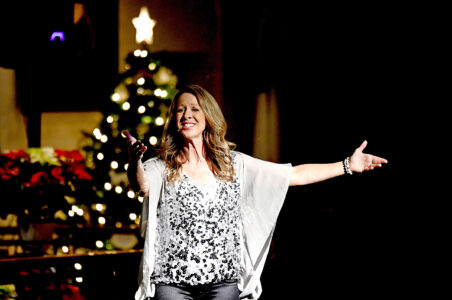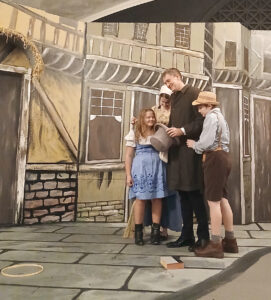Into Ukraine
An unplanned shortcut leads to an interesting journey for this writer and his entourage
-
-Submitted photo
David McGuire’s van, with trailer in tow, travels down the logging road shortcut.
-
-Submitted photo
Tim Bailey, in the driver’s seat, goes over the shortcut with missionary David McGuire.
-
-Submitted photo
Tim Bailey poses next to the van dubbed “Scooby Doo.”

-Submitted photo
David McGuire's van, with trailer in tow, travels down the logging road shortcut.
Editor’s note: This is the third in a series exploring Webster City and Webster City Rotary’s connection to Ukraine. As you will read, the writer, Doug Bailey, is working from an intensely personal perspective.
“Dad, do you want to take a load of food up into Ukraine?” Tim asked one morning.
Tim had always turned down requests to drive or ride along on food and supply deliveries into Ukraine. Being a family man with young children, he felt forays into even safe areas of Ukraine was not worth the risk.
But this time, when fellow missionary David McGuire called needing another driver for a run up to Chernivtsi, Ukraine, he told him, “My dad is here. Let me see if he wants to go. If he does, we will.”
In spite of protests from his mother, Tim and I on a Friday morning headed to a small village just a few kilometers outside of Sighisoara to where McGuire and his wife live.

-Submitted photo
Tim Bailey, in the driver's seat, goes over the shortcut with missionary David McGuire.
For 28 years McGuire has been “working for the Lord” in Romania and mostly in and around Sighisoara. His missionary efforts were made possible and still are by supporters from his native England. Prior to the start of the war he was engaged in building small homes for the “Roma” people in the villages around Sighisoara.
The Roma, also known by the more derogatory name gypsy, for the most part no longer roam from one village or country to another. Still generally very poor, they tend to live in camps on the edges of cities and in the smaller villages throughout the countryside.
Prior to Romania being accepted into the European Union, the Roma were simply nonexistent in the eyes of the federal, state and local government. In the years under communism and Soviet Russia’s control, the Roma were ignored. Life has gotten better for them in recent years, but there is still a long way to go. It is mostly missionaries from around the world that are moving the needle on the life condition for these folks.
When we got to the village of Danes and turned onto McGuire’s street, there was a large red Toyota van with an enclosed trailer hooked on behind and a blue van with tulips painted on the sides. Neither vehicle was close to new. The blue van had been aptly nicknamed the “Scooby Doo” van, I would learn, by previous volunteer crews. It must have belonged to a floral shop in a previous life.
Tim and I would be driving Scooby Doo. Both vans and the trailer had magnetic signs on them indicating in multiple languages that these were humanitarian aid vehicles.

-Submitted photo
Tim Bailey poses next to the van dubbed "Scooby Doo."
On the way out to Danes we smelled something hot on Tim’s vehicle, a Renault Kangoo. (The vast array of European and Asian brands and models of vehicles in Romania and probably throughout Eastern Europe is so interesting.) Tim was under the Kangoo checking out the emergency brake cable when David, his wife, Rodica, and another volunteer, Cristi, drove up.
Cristi and I had met before. He is Roma and one of the hardest-working and honest people I have ever met. Tim had hired him to help work on his house when I was there in years past. He hopped out to help Tim analyze the Kangoo.
I had never met the 6-foot-plus Englishman from the village of Glossop near Manchester or his wife, who is Romanian. After quick introductions, David walked over to the Kangoo to add his thoughts on its issues. Rodica told me with a smile, “Autos here, always broke, always a problem.”
I did not know how prophetic her comment would become. She was a teenager during communism and we had a short but interesting conversation about those times. Tim was pouring water on a rear wheel that sizzled when David said in his thick brogue, “OK, we need to get going.” Cristi and Tim thought they had the Kangoo’s problem resolved.
We loaded our overnight packs, snacks and drinks into Scooby Doo for the 12-hour trip to Chernivtsi. David came over to Tim’s window with a map on his phone showing Tim a shortcut that he had found. It was a logging road but this time of the year it should be in good shape.
Although I am easily sucked in by shortcuts, I rarely have good luck with them. I didn’t say anything. After the shortcut, Cristi told Tim and I, “I tried to tell him.”
David had the vans loaded to the ceiling with boxes of cooking oil, canned meats, rice, the standard fare I was now used to seeing. There were also a few boxes of a pastry with a chocolate filling. We could snack on these if we wanted, but they were for a special purpose later in the journey. The other van was loaded exactly the same as ours. Both loaded with probably twice the weight that they were built to carry. The trailer was loaded with some food boxes too, but was mostly jammed full of used clothing.
I wrote down in my notebook that we left Danes at 9:45 a.m. David was driving the other van with Cristi riding shotgun; Rodica was staying home.
The roads in Romania are narrow, some more narrow than others. A lane and a half is standard on what I would call secondary roads. Primary highways are close to two lanes, in my opinion, with neither secondary or primary having any uniform shoulders, if any. I do have to admit that I did see significant improvement in roads from our last visit in 2021. The bits and pieces of a high-speed railway sprinkled throughout the countryside with the goal of connecting Sighisoara to Western Europe looked the same. Tim believes that the government has chosen to put more money into roads.
Our trip north to the western border of Ukraine began uneventfully. We averaged around 55 to 60 mph. With that being the top speed, given how loaded the vans were, we didn’t need to worry about passing anyone, except for the random horse and wagon.
While they are not allowed on primary highways, you always have to be on the lookout for them on the secondary roads and streets in town. During the time frames before and after school they will be full of children, with an older child driving the horse or horses.
Driving through the countryside in mid-March, I was surprised to see many farm fields already being prepared for planting. The weather was gorgeous and Tim said that this spring was way earlier than normal.
David McGuire has been making these trips multiple times a month since the war started. He is always on the hunt for food to run into a variety of locations in Ukraine near the border and oftentimes deeper into the interior. In February, he and Cristi had just unloaded at a church in Odessa when a Russian cruise missile came close to taking out Ukrainian President Volodymyr Zelensky and the Prime Minister of Greece who were meeting in the port city. Cristi had videos showing the smoke from the explosion.
Early on, David would bring back van loads of refugees to Sighisoara after making a delivery of food and other supplies. Many just wanted to get out of the fighting and had friends or family elsewhere in Europe to go stay with. Many had nowhere else to go and would stay in Sighisoara.
When I interviewed the two teenage girls at the Joy Center, I asked Alona how she and her mother had gotten to Sighisoara from Ukraine.
“David brought us,” she said. “Do you know David?” She didn’t know his last name.
The short cut now lay before us. As we turned off the hard surface primary road onto a dirt road it started to snow. We were headed to northern Romania into the mountains. The further we drove, the slower we had to go. Worn divots turned into foot deep holes. David was leading; we had no problem keeping up.
The pictures do not do justice to the experience. It was indeed a long, winding road through the mountain pass with massive pines and valleys on both sides. It was beautiful, Tim and I both agreed, but we were just concerned as to how long it was going to last.
After an hour and a half we popped out onto a hard surface. A short way down the road was a town where we stopped for a meal and fuel. I told Cristi that I was glad we didn’t have a van breakdown while we were on the shortcut. He responded, “No, that is the kind of place that you want to break down. The people who live out there in the middle of nowhere know how to fix most anything with nothing.”
I was happy to not test his theory … that day.
We reached the Romanian side of the border at 7:15 p.m. It was raining and very dark. We had driven by miles of semi tractor trailers pulled off to the side of the road, waiting to cross the border.
David hopped out of his van and came back to tell us to sit tight; do not get out. We had all our paperwork organized and ready to present. He walked over to the Romanian border guards with hands full of the chocolate-filled pastries. I don’t know if it made a difference, but it was fun to watch him work the guards over with the sweet bribes. We did not spend long on the Romanian side. The Ukrainian side would take a little longer.






